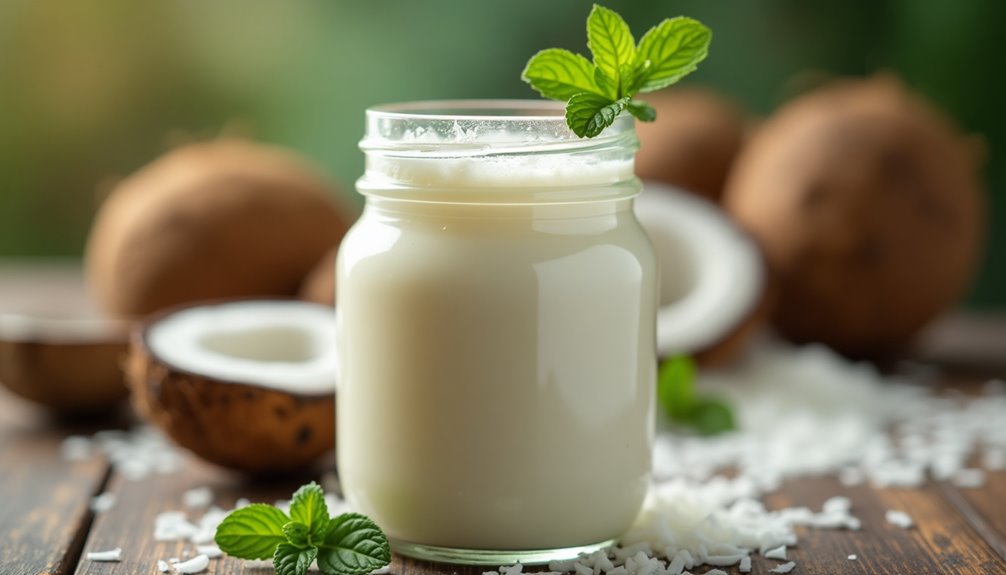Coconut milk is an excellent substitute for heavy cream, providing a creamy texture with lower calories and unique health benefits. It's rich in medium-chain triglycerides (MCTs) and is a safe option for those with lactose intolerance or dairy allergies. You can easily replace heavy cream with coconut milk at a 1:1 ratio, though you might need to adjust other liquids for consistency. Choose canned coconut milk for a robust flavor and cook at low temperatures to avoid curdling. This versatile ingredient can enhance a variety of dishes, and there's much more you can try to transform your cooking.
Key Takeaways
- Coconut milk is a versatile substitute for heavy cream, providing a rich, creamy texture in various dishes.
- Use canned coconut milk for a more robust flavor and adjust other liquids for desired consistency.
- Opt for a 1:1 substitution ratio with potential modifications based on the recipe's needs.
- Coconut milk is a safe choice for those with lactose intolerance or dairy allergies, offering health benefits.
- Pair coconut milk with complementary ingredients like ginger or curry to enhance the overall taste of your dishes.
Benefits of Coconut Milk
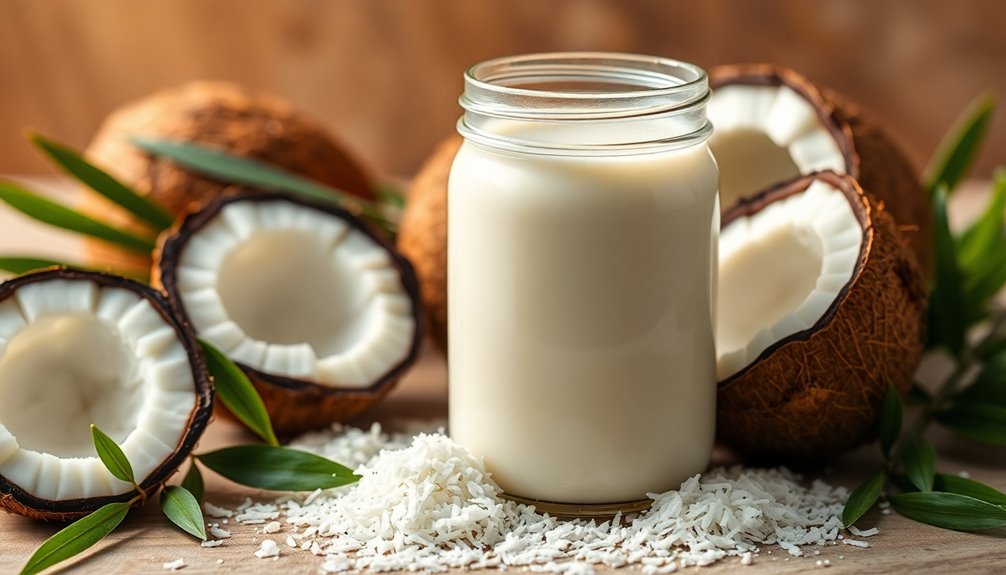
When you explore the benefits of coconut milk, you'll find it's a versatile alternative to heavy cream. This dairy alternative not only enhances your dishes but also offers significant advantages for your health.
One of the standout features of coconut milk is its rich content of medium-chain triglycerides (MCTs), which can boost your metabolism and support weight management.
Additionally, coconut milk is an excellent choice for those seeking to improve skin health. Its natural fats help moisturize and nourish your skin from within, promoting a radiant complexion. The presence of lauric acid in coconut milk also provides antimicrobial properties, which can aid in fighting acne and improving overall skin appearance.
For individuals with lactose intolerance or dairy allergies, coconut milk presents a safe and delicious option. You can enjoy the creaminess and flavor without the discomfort associated with traditional dairy products. This makes it a perfect addition to your cooking, whether you're whipping up soups, sauces, or desserts.
Moreover, the versatility of coconut milk allows you to incorporate it into your daily diet seamlessly. You can use it in smoothies, curries, or even as a base for your morning coffee. By choosing coconut milk, you're not just opting for a tasty substitute; you're also embracing a healthier lifestyle that promotes skin health and reduces the risks associated with dairy consumption.
How to Substitute Coconut Milk
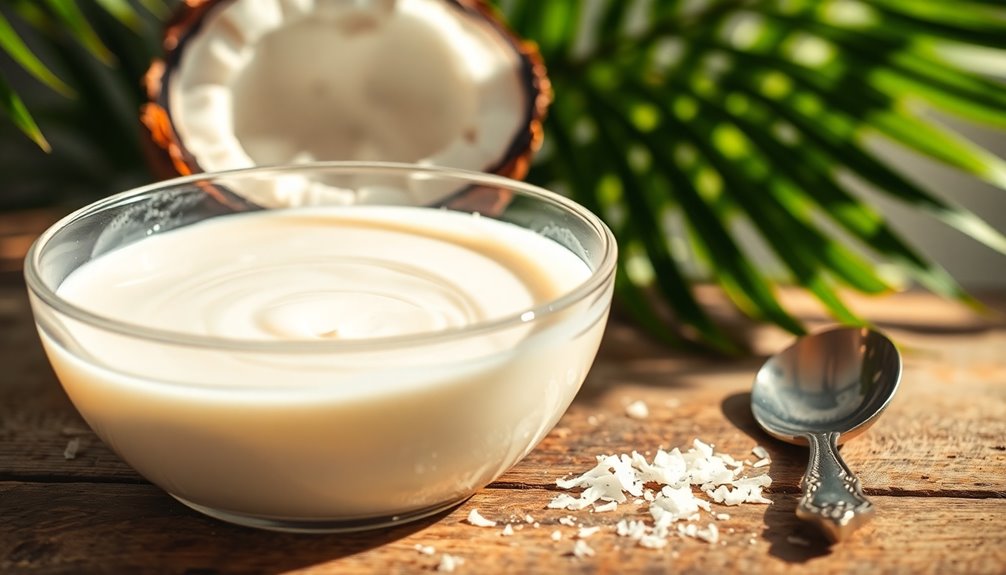
Replacing heavy cream with coconut milk is a simple process that can enhance your recipes while offering a more nutritious choice. To successfully make the transition, grasping the consistency variances and flavor characteristics of both ingredients is crucial. Coconut milk is typically thinner than heavy cream, potentially impacting the texture of your dish. When utilizing coconut milk, adjustments to other liquids in the recipe may be necessary to achieve the desired thickness.
Initially, select the appropriate variety of coconut milk. Opting for canned coconut milk provides a more robust flavor and creamier consistency compared to the boxed version. For dishes that demand a denser texture, contemplate using full-fat canned coconut milk or chilling the can overnight and utilizing only the solidified cream layer on top. This method enables you to closely replicate the thickness of heavy cream.
Consider the flavor profiles as well. Coconut milk contributes a subtle sweetness and a touch of coconut essence that could enhance or modify your dish. When preparing savory dishes, counterbalance this sweetness with salt or acidity. For desserts, you can enrich the coconut essence with vanilla or spices such as cinnamon.
While a 1:1 ratio usually suffices for substitution, adjustments may be necessary based on your dish's specific requirements. By recognizing these subtleties, you can craft delectable meals that retain their essence while embracing a more health-conscious option.
Cooking Tips and Tricks
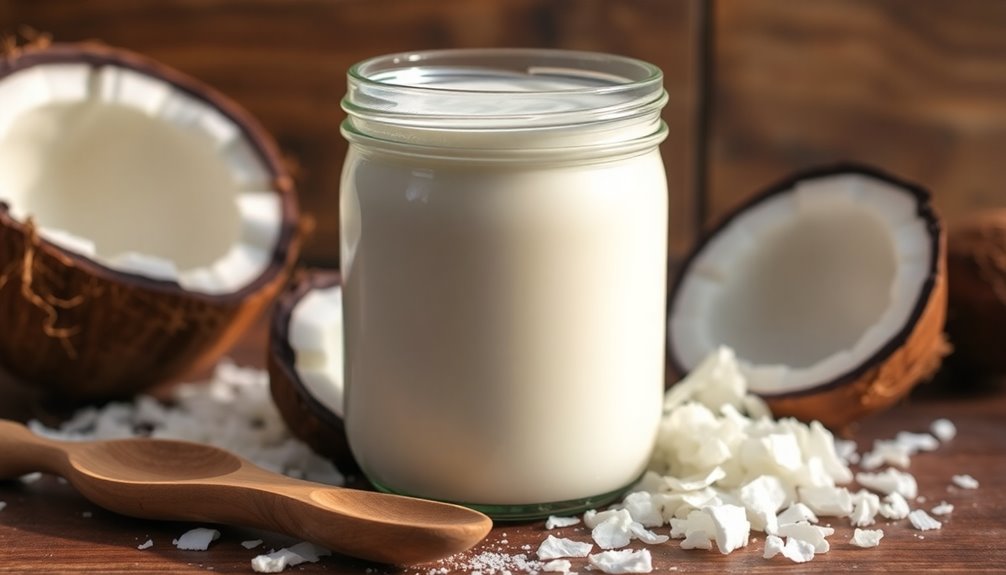
To elevate your cooking with coconut milk, understanding its unique properties and how to manipulate them is essential. This creamy alternative can enhance both flavor and texture in your dishes, but it requires some specific cooking techniques to shine. Here are three tips to get you started:
- Choose the Right Type: Coconut milk comes in various forms, from light to full-fat. For recipes that need a rich, thick consistency, opt for full-fat coconut milk. For lighter dishes, light coconut milk works beautifully.
- Cook at the Right Temperature: Coconut milk can curdle if exposed to high heat for too long. To prevent this, add it towards the end of your cooking process, or simmer on low heat. This technique helps maintain its creamy texture while infusing your dish with its unique flavor.
- Pair with Alternative Ingredients: When using coconut milk, consider complementary flavors like ginger, lime, or curry. These alternative ingredients can enhance the overall taste and create a balanced dish that feels cohesive.
Delicious Recipes to Try
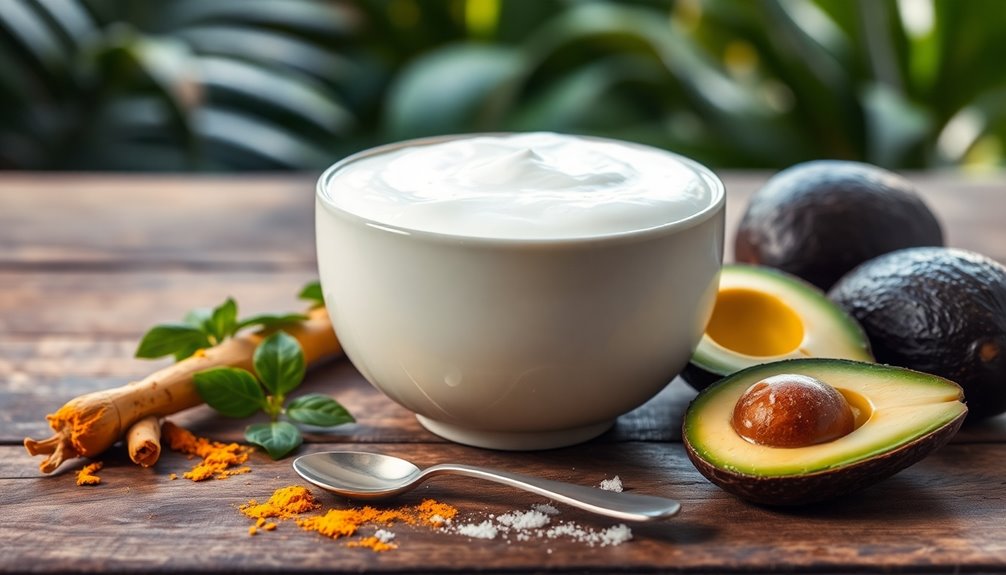
Coconut milk's versatility makes it a fantastic ingredient in a variety of dishes, offering both creamy texture and rich flavor. You can easily swap out heavy cream for coconut milk in recipes like curries, soups, and desserts, enhancing the dish's overall appeal.
When you explore flavor pairings, consider using coconut milk with spices such as ginger, garlic, and turmeric; these combinations create a harmonious balance that excites the palate.
For a delightful soup, try a Thai coconut curry. Start with sautéed onions, garlic, and ginger, then add your choice of vegetables and proteins. Pour in coconut milk and curry paste, letting the flavors meld together. The resulting dish will showcase the unique texture differences between heavy cream and coconut milk, providing a lighter, yet satisfying alternative.
If you're in the mood for a sweet treat, whip up a coconut panna cotta. Combine coconut milk with agar-agar or gelatin, sweeten with honey or maple syrup, and infuse with vanilla. This dessert not only stands out with its silky mouthfeel but also pairs beautifully with fresh fruits like mango or berries.
Lastly, don't forget to experiment with smoothies. Blend coconut milk with spinach, banana, and a scoop of protein powder for a creamy, nutrient-packed drink that keeps you energized. Each of these recipes highlights how coconut milk can transform your cooking, inviting you to embrace its delightful taste and texture in your kitchen.
Nutritional Comparison
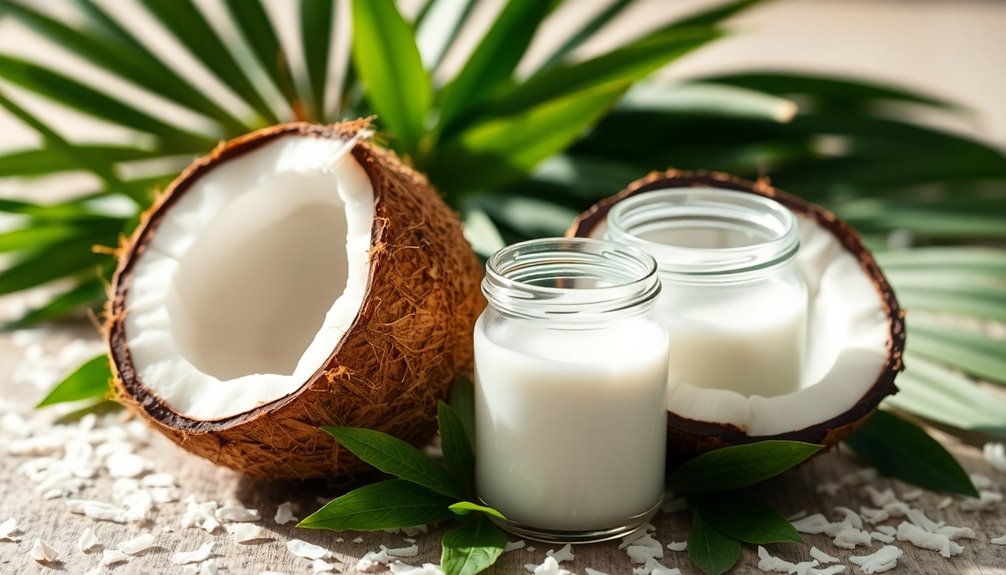
When comparing the nutritional profiles of heavy cream and coconut milk, understanding their distinct compositions and health benefits is essential. Both options offer unique attributes, but they cater to different dietary needs and preferences.
Here's a quick breakdown of their key differences:
- Fat Content: Heavy cream is rich in saturated fats, containing about 36% fat, which can contribute to higher calorie intake. In contrast, coconut milk has a fat content of around 24%, primarily from medium-chain triglycerides (MCTs), which may aid in metabolism and weight management.
- Vitamin Content: Heavy cream provides vitamins A, D, E, and K, essential for various bodily functions. Coconut milk, while lower in these vitamins, offers a good source of manganese and copper, which are essential for energy production and enzyme function.
- Caloric Density: Heavy cream is calorie-dense, with approximately 400 calories per 100 grams, making it a rich source of energy. Coconut milk, however, contains about 230 calories per 100 grams, making it a lighter alternative for those watching their calorie intake.
Ultimately, the choice between heavy cream and coconut milk depends on your dietary goals and preferences. If you're seeking a lower-calorie option with unique health benefits, coconut milk might be your go-to. However, if you need the richness of heavy cream for specific recipes, it remains a classic choice. Understanding these differences empowers you to make informed decisions in your cooking and nutrition journey.
Frequently Asked Questions
Can I Use Coconut Milk in Coffee Recipes?
Absolutely, you can use coconut milk in coffee recipes! It's a great alternative that creates creamy coffee blends. When you're looking for coconut milk substitutes, consider the type of coconut milk you choose; full-fat offers a richer texture, while light options provide a milder flavor.
Experimenting with different brands can enhance your coffee experience, making it feel cozy and inviting. You'll enjoy the unique taste and creamy texture it brings to your favorite brews!
How Long Does Opened Coconut Milk Last in the Fridge?
Once you open coconut milk, it typically lasts about 5 to 7 days in the fridge. To maximize its shelf life, store it in an airtight container. If you've poured it into a different container, label it with the opening date for easy tracking.
Keep an eye out for any signs of spoilage, like off smells or separation. Following these storage tips helps guarantee you enjoy your coconut milk safely!
Is Canned Coconut Milk Healthier Than Boxed Coconut Milk?
When considering whether canned coconut milk is healthier than boxed coconut milk, you'll want to look at the nutritional comparison. Canned coconut milk typically has a higher fat content and may contain fewer preservatives, while boxed options often have added vitamins but might also include stabilizers. Your taste preference plays a pivotal role too; canned tends to be creamier, while boxed is lighter. Ultimately, choose based on your health goals and flavor desires!
Can I Freeze Coconut Milk for Later Use?
Freezing coconut milk is like capturing summer in a jar; it allows you to preserve that creamy goodness for later. When you freeze coconut milk, the consistency changes, often becoming grainy or separated. However, you can still use it in smoothies or soups after thawing.
Pour it into ice cube trays for easy portioning. Just remember to shake or blend it well before using to restore its creamy texture!
Does Coconut Milk Have a Strong Coconut Flavor?
Yes, coconut milk does have a distinct coconut flavor, but its intensity can vary. In cooking applications, this flavor can enhance dishes like curries and smoothies.
However, if you're looking for flavor neutrality, consider using lighter coconut milk or blending it with other ingredients. This way, you can enjoy the creaminess without overwhelming the dish.
Experimenting will help you find the balance that suits your taste and culinary needs.
Conclusion
Incorporating coconut milk as a substitute for heavy cream can elevate your dishes while offering a dairy-free alternative. For instance, a home cook named Sarah transformed her traditional creamy pasta into a rich, coconut-infused delight, impressing her guests at a dinner party. Not only did it cater to dietary restrictions, but it also added a unique twist to the classic recipe. By experimenting with coconut milk, you can enhance flavors and enjoy healthier meals without sacrificing taste or texture.

